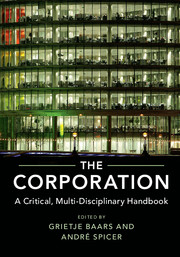Book contents
- Frontmatter
- Contents
- List of Contributors
- Acknowledgements
- Introduction: Why the Corporation?
- PART I DISCIPLINARY OVERVIEWS
- PART II INTERDISCIPLINARY THEMATIC CHAPTERS
- 1 The Evolution of the Corporate Form
- 2 The Multinational Corporate Group
- 3 The Financialization of the Corporation
- 4 Corporate Value Chains
- 5 Corporate Citizenship
- a The Functions and Dysfunctions of Corporate Social Responsibility
- b Reconsidering the Critical Corporate Social Responsibility Perspective through French Pragmatic Sociology: Subverting Corporate Do-Gooding for the Common Good?
- c Certification Schemes and Labelling as Corporate Governance: The Value of Silence
- 6 The Corporation and Crime
- 7 The Corporation and Ideology
- 8 Corporation and Communities
- 9 Corporations and Resistance
- 10 Alternatives to the Corporation
- Index
- References
a - The Functions and Dysfunctions of Corporate Social Responsibility
from 5 - Corporate Citizenship
Published online by Cambridge University Press: 31 March 2017
- Frontmatter
- Contents
- List of Contributors
- Acknowledgements
- Introduction: Why the Corporation?
- PART I DISCIPLINARY OVERVIEWS
- PART II INTERDISCIPLINARY THEMATIC CHAPTERS
- 1 The Evolution of the Corporate Form
- 2 The Multinational Corporate Group
- 3 The Financialization of the Corporation
- 4 Corporate Value Chains
- 5 Corporate Citizenship
- a The Functions and Dysfunctions of Corporate Social Responsibility
- b Reconsidering the Critical Corporate Social Responsibility Perspective through French Pragmatic Sociology: Subverting Corporate Do-Gooding for the Common Good?
- c Certification Schemes and Labelling as Corporate Governance: The Value of Silence
- 6 The Corporation and Crime
- 7 The Corporation and Ideology
- 8 Corporation and Communities
- 9 Corporations and Resistance
- 10 Alternatives to the Corporation
- Index
- References
Summary
Introduction: The (Re)emergence of Corporate Social Responsibility
In 2008, as the UK government was in the midst of bailing out much of the financial services sector, Prime Minister Gordon Brown was keen to adopt the tone not of regulation nor criminalization, but of moral re-energization. In doing so, the hegemonic common sense, constructed over forty years, as regards regulation of corporate activity – that it represents a burden upon socially useful and socially productive corporate capacities – was remarkably undented by the financial collapse and international recession (Crouch, 2011). Thus, despite having overseen an unprecedented bailout of the banking system – a massive state subsidy funded by the taxpayer that effectively socialized the consequences of long-term, systematic private greed and possible (albeit never to be uncovered) illegality – the UK's Labour government underscored its commitment to the ‘free-market system’ and ‘light-touch regulation’, while again declaring its continued faith in business morality and corporate social responsibility:
Our government is pro-business; I believe in markets [and] entrepreneurship, and there are many areas of the economy that need the spur of more competition. But the events of the past months bear witness, more than anything in my lifetime, to one simple truth: markets need morals.
(Brown, 2008)This initial political response to the financial crisis – to eschew the need for more regulation through a focus on morality as a lens through which economic actors could be seen as central to any solution rather than the problem – was soon to form the basis of a consensus. Specifically, while senior political figures frequently espoused the need for better regulation of the financial services sector, the nature of this regulation was hardly specified, while these claims ran alongside the mantra that regulation in general remained over-burdensome.
- Type
- Chapter
- Information
- The CorporationA Critical, Multi-Disciplinary Handbook, pp. 347 - 359Publisher: Cambridge University PressPrint publication year: 2017

